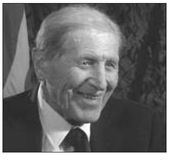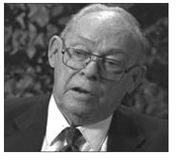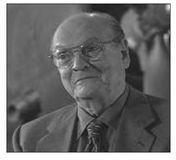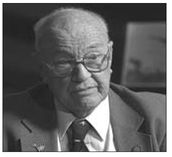War Stories II (78 page)
Authors: Oliver L. North
LIEUTENANT ROBERT HITE
dropped to just eighty pounds during his forty-month stay in a Japanese prison. He endured captivity, torture, and starvation before his release on 20 August 1945, nearly a week after the war ended. Hite went on to serve in Korea and Morocco. In civilian life, he had a career managing hotels in Arkansas, Oklahoma, and Texas. He and his wife, Dorothea, live in Camden, Arkansas.
dropped to just eighty pounds during his forty-month stay in a Japanese prison. He endured captivity, torture, and starvation before his release on 20 August 1945, nearly a week after the war ended. Hite went on to serve in Korea and Morocco. In civilian life, he had a career managing hotels in Arkansas, Oklahoma, and Texas. He and his wife, Dorothea, live in Camden, Arkansas.

LIEUTENANT RICHARD COLE
served out his time until the end of World War II as an Army Air Corps pilot. Dick flew transports over “the hump”âthe menacing Himalayan mountain rangeâuntil June 1943. Then he came home, reenlisted, and stayed in the service for twenty-six years, after which he retired to his home in Dayton, Ohio.
served out his time until the end of World War II as an Army Air Corps pilot. Dick flew transports over “the hump”âthe menacing Himalayan mountain rangeâuntil June 1943. Then he came home, reenlisted, and stayed in the service for twenty-six years, after which he retired to his home in Dayton, Ohio.

LIEUTENANT HENRY POTTER
came back home with the four other crew members from the lead aircraft of Doolittle's Task Force 16, and shortly afterwards was reassigned to his old unit and a B-26 bomber. This time he headed for North Africa until the end of World War II. Potter stayed in the Army for thirty years, reaching the rank of colonel, then retired to his home in South Dakota.
came back home with the four other crew members from the lead aircraft of Doolittle's Task Force 16, and shortly afterwards was reassigned to his old unit and a B-26 bomber. This time he headed for North Africa until the end of World War II. Potter stayed in the Army for thirty years, reaching the rank of colonel, then retired to his home in South Dakota.

FIRST LIEUTENANT JOHN ALISON
made the first night kills in the CBI theater, for which he was awarded the Distinguished Service Cross and the Silver Star. Ending his tour as commander of the 75th Fighter Squadron, Alison left as an ace with seven confirmed “kills” and a number of “probables.” After the war, Alison served as an assistant secretary of commerce, president of the Air Force Association, and a major general in the U.S. Air Force Reserves. He recently retired as vice president of the Northrop Corporation.
made the first night kills in the CBI theater, for which he was awarded the Distinguished Service Cross and the Silver Star. Ending his tour as commander of the 75th Fighter Squadron, Alison left as an ace with seven confirmed “kills” and a number of “probables.” After the war, Alison served as an assistant secretary of commerce, president of the Air Force Association, and a major general in the U.S. Air Force Reserves. He recently retired as vice president of the Northrop Corporation.

LIEUTENANT CHARLES TURNER
was discharged in July 1945 and returned to the States, where he accepted a sales position with a Chevrolet dealership. He later accepted a position with a new company and stayed with them for eighteen years. In 1968, Turner formed his own company and sold it in 1976. He remained active on its board and has served as chairman since 2000. He and his wife, Dorothy, have two daughters, five grandchildren, and four great-grandchildren. Turner and his wife live on a ranch outside Waco, Texas, where he has been ranching since 1971.
was discharged in July 1945 and returned to the States, where he accepted a sales position with a Chevrolet dealership. He later accepted a position with a new company and stayed with them for eighteen years. In 1968, Turner formed his own company and sold it in 1976. He remained active on its board and has served as chairman since 2000. He and his wife, Dorothy, have two daughters, five grandchildren, and four great-grandchildren. Turner and his wife live on a ranch outside Waco, Texas, where he has been ranching since 1971.

STAFF SERGEANT RAYMOND “STUB” BLUTHARDT
returned from the war to join his wife's parents in operating a Phillips 66 filling station and garage. He later took a civil service position at nearby Ft. Riley, where he stayed for twenty-five years. Bluthardt served as a committee chairman with the Boy Scouts and was the fire chief for the local volunteer fire department. He married his sweetheart, Geraldine, and they had a daughter and a son, four grandchildren, and four great-grandchildren. Ray Bluthardt passed away on 28 March 2004.
returned from the war to join his wife's parents in operating a Phillips 66 filling station and garage. He later took a civil service position at nearby Ft. Riley, where he stayed for twenty-five years. Bluthardt served as a committee chairman with the Boy Scouts and was the fire chief for the local volunteer fire department. He married his sweetheart, Geraldine, and they had a daughter and a son, four grandchildren, and four great-grandchildren. Ray Bluthardt passed away on 28 March 2004.

PRIVATE FIRST CLASS KYLE THOMPSON
returned to the U.S. and wrote a book about his experiences,
A Thousand Cups of Rice
, the story about the “lost battalion” and their survival as slave laborers for the Japanese. After the war he became a journalist, serving as Austin bureau chief for United Press International and as an editorial writer for the
Fort Worth Star-Telegram
. Kyle Thompson passed away 5 March 2004.
returned to the U.S. and wrote a book about his experiences,
A Thousand Cups of Rice
, the story about the “lost battalion” and their survival as slave laborers for the Japanese. After the war he became a journalist, serving as Austin bureau chief for United Press International and as an editorial writer for the
Fort Worth Star-Telegram
. Kyle Thompson passed away 5 March 2004.
Â
CAPTAIN JOSEPH ROCHEFORT
was the code-breaker whose expertise made the difference at the Battle of Midway, but he never received recognition by Washington. After the war, he settled in Manhattan Beach, California. He remained in the Navy and was called to duty for the Korean War and later for the Vietnam War. He finally retired from the military at age forty-nine and returned to his home in California, where he died in 1976. In 1985, Admiral Mac Showers took it upon himself to “right a big wrong” and recommended the World War II code-breaker for a medal. President Ronald Reagan awarded the Distinguished Service Medal, the nation's highest civilian honor, to Rochefort posthumously.
was the code-breaker whose expertise made the difference at the Battle of Midway, but he never received recognition by Washington. After the war, he settled in Manhattan Beach, California. He remained in the Navy and was called to duty for the Korean War and later for the Vietnam War. He finally retired from the military at age forty-nine and returned to his home in California, where he died in 1976. In 1985, Admiral Mac Showers took it upon himself to “right a big wrong” and recommended the World War II code-breaker for a medal. President Ronald Reagan awarded the Distinguished Service Medal, the nation's highest civilian honor, to Rochefort posthumously.

ENSIGN LEWIS HOPKINS
received the Navy Cross and was promoted following his exploits at Midway, Guadalcanal, and other South Pacific battles. After World War II, Hopkins reenlisted in the Navy, achieving the rank of admiral. He retired in 1974.
received the Navy Cross and was promoted following his exploits at Midway, Guadalcanal, and other South Pacific battles. After World War II, Hopkins reenlisted in the Navy, achieving the rank of admiral. He retired in 1974.

PETTY OFFICER WILLIAM SURGI, JR.
taught aviation for the Navy in Jacksonville, Florida, in 1945. Some time later he was given the responsibility of training Argentine pilots. In 1981, he was part of Operation Unitas and was sent to Chile. After forty-three years in the Navy, he retired in 1984 on his sixtieth birthday.
taught aviation for the Navy in Jacksonville, Florida, in 1945. Some time later he was given the responsibility of training Argentine pilots. In 1981, he was part of Operation Unitas and was sent to Chile. After forty-three years in the Navy, he retired in 1984 on his sixtieth birthday.

SEAMAN SECOND CLASS FRANK HOLMGREN
was discharged 7 December 1945âexactly four years to the day after Pearl Harbor was bombed. He was assigned to duty at the U.S. Navy's Earle Ammunition Depot in Colts Neck, New Jersey, to finish out his tour, and took a civilian position at EAD after the war for a thirty-five-year career there.
was discharged 7 December 1945âexactly four years to the day after Pearl Harbor was bombed. He was assigned to duty at the U.S. Navy's Earle Ammunition Depot in Colts Neck, New Jersey, to finish out his tour, and took a civilian position at EAD after the war for a thirty-five-year career there.

Other books
Big Girl Small by Rachel DeWoskin
When Grnadfather Journeys Into Winter by Craig Kee Strete
She's Me by Mimi Barbour
Carrhae by Peter Darman
Blue Colla Make Ya Holla by Laramie Briscoe, Chelsea Camaron, Carian Cole, Seraphina Donavan, Aimie Grey, Bijou Hunter, Stella Hunter, Cat Mason, Christina Tomes
Gun Control in the Third Reich by Stephen P. Halbrook
Where There's Smoke: A Texas Heat Novel by Octavia McKenzie
Perfectly Broken by Maegan Abel
Riot by Walter Dean Myers
Taylor Made Owens by Power, R.D.